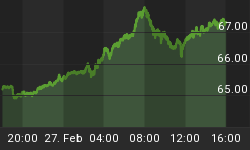It seems very strange to find myself suddenly on the more-optimistic side of opinion when it comes to the situation in Europe. That isn't to say that I am optimistic in an absolute sense; I still think that the Euro will either fracture or dissolve, a number of banks will fail, be nationalized, or be zombied, and several nations will default or restructure debt significantly (although if the Euro disintegrates, then inflation in some countries may take the place of an overt default since countries will then control their own currencies and have that alternative). I think that still places me squarely in the long-term pessimistic camp. But I am more optimistic about the near-term trajectory of the crisis.
Maybe even "optimistic" is too strong. I suppose I just think that the huge ECB program is the best real attempt that the European policymakers have made so far to at least extend the game. Unlike all of the other measures that have been taken (or hinted at being taken, or promised and not taken), this is the first one that has at least a chance to push off the day of reckoning. Yes, as I wrote yesterday, there are lots of things that can still go wrong but there are at least incentives for the cartel to remain together for a while.
The solution so far looks to be just naked printing in everything but name. The take-up of the 3-year ECB lending facility today was an enormous €489bln, a number which will likely grow to be more enormous before it shrinks. And there is just no way that I can see that the ECB can sterilize the activity on such a scale. I could be wrong. I always could be wrong. But whatever this does for the 'ol can, it certainly seems to represent another goose for the global reflation trade.
.
The other big news on Wednesday was the National Association of Realtors revisions to past Existing Home Sales and inventories. Sales from 2007-2011 were revised down 14-15% and inventories as well. The main 'technical issue' was that beginning in 2007 some houses and sales were double-counted when they showed up in multiple listings, and there were several related issues of that ilk (all of which, it seems, inflated sales). Changing the data doesn't really change the depth of the crisis, but we now have a better idea of how deep the crisis actually was. But one Wall Street economist who shall remain nameless wrote this in his/her analysis:
"...the revision does NOT imply that the NAR has deliberately been cooking the books over the past few years, trying to paint an overly rosy picture of the housing market. There were genuine data issues to be overcome."
Sure, and interestingly all of the data issues began in 2007. Hmmm, what else was happening in 2007? Oh, I remember - existing home sales were beginning to fall alarmingly (see Chart, source Bloomberg). The white line, which represents the original release for the pace of sales, actually rose in early 2007, right when the actual sales, based on the revisions, were falling off a cliff. The NAR at the time was assuring us that the market was healthy, and somehow their estimate of sales was suddenly off by a 1mm units/year pace and no one thought anything was funny with the data. Sure.

Bloomberg chart showing original release and new,
revised level for Existing Home Sales.
The fact that home sales fell more steeply and more deeply than was previously thought would have been great information for policymakers to have had in, say, 2007 when the Federal Reserve was holding the Fed funds rate steady and considering hiking further. I wonder what would have happened if, data in hand, the FOMC had started easing 9-12 months earlier than they ultimately did. It's an interesting thought experiment. Why is it only bankers' heads that should be hoisted on a spit?
The "new" trajectory of sales has another implication. It makes it even more amazing that core inflation never declined. The housing crisis was significantly worse than we had thought, which makes the arguments of the classical economists even less defensible than they were. By all that is good and holy and Keynesian, the core price level - nearly half of which is housing - should have declined. In only two months out of the last 48 have prices declined on a month-over-month basis, and one of those was so marginal it rounded to 0.0. The only meaningfully-negative month, January 2010, saw a -0.13% decline in core inflation. The worst recession in 80 years had almost no effect on prices. Does that evidence count for anything?
Pardon the rant, but it continues to baffle me that this even remains a debate.
Tomorrow, I plan to write my next-to-last comment of the year, and look at one or two items from the Z1 data release that the Fed put out earlier in December. Ordinarily I get to it sooner, but the story has been constant for quite a while. There is one interesting little twist this quarter, and I want to bring it up before I forget it. The last comment of the year, which will come out sometime next week, will be my year-end portfolio-allocation exercise.















